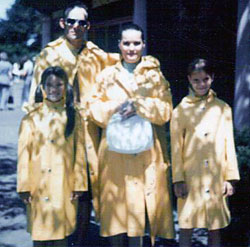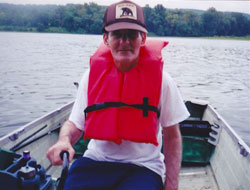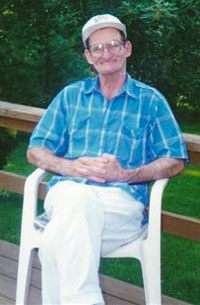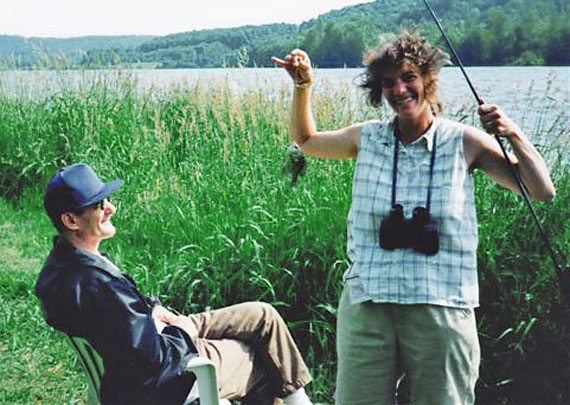Robert Chiappini
by Tina Moyer
My father, Robert Chiappini, became sick a few years prior to his diagnosis. He was approximately 58 when his symptoms began. Dad was a roofer who began having falls, developed a festinating gait, and generally did not feel well. Our first thought was that he had Parkinson’s disease.
 In 1997, doctors said my dad had ALS, and for a year, we thought that was what it was. I lived 2 hours away from Dad, so it was very hard having him sick and so far away, but I managed to find an ALS support group for him to attend. He loved it. Even though it was a very sad time for him, Dad was able to make new friends there. Unfortunately, his best support group friend passed away – I think that really had an impact on him.
In 1997, doctors said my dad had ALS, and for a year, we thought that was what it was. I lived 2 hours away from Dad, so it was very hard having him sick and so far away, but I managed to find an ALS support group for him to attend. He loved it. Even though it was a very sad time for him, Dad was able to make new friends there. Unfortunately, his best support group friend passed away – I think that really had an impact on him.
In 1998, Dad was transferred to a different neurologist in Danville, Pennsylvania. When we first met the new neurologist, he immediately questioned the ALS diagnosis. He put my dad in the hospital for a week to administer tests and told us that he would have a diagnosis by the end of the week. Since Dad was only going to be 30 minutes from where I lived, I took a medical leave of absence so that I could be with him each day.
The tests were hard on him – spinal taps, x-rays, CT scans, MRIs, mental tests, and loads of blood work. He endured pretty much every test that you can imagine, but proved to be quite the trooper. I don’t know how he did it but I shed tears for him every day that he had to endure another test. By the end week, he was ready to go home.

By the end of the week, we had been given the diagnosis – progressive supranuclear palsy (PSP). The only question Dad had for the neurologist was, “how long?” I remember how my heart immediately hurt. The doctor could not provide the answer. He said it could be a year or a couple of years, but that those numbers were just guesses. The doctor recommended that my dad go to a care facility, but that was not a realistic option for us. My mother was his primary caregiver and she still continued to work, as well. Dad had a nurse who came and helped him bathe, took him for walks and fixed lunch for him.
That same night, I got on the internet and found CurePSP. They were so helpful and even had a place on the website to meet other people with PSP and their caregivers. Knowing that my father would see his gait worsen, have more trouble eating, and eventually leave us, was devastating to us. As I had done quite a bit of research of PSP, I gave all of the information that I found to my family and they were, expectedly, very upset by it. I believe it may have just been too hard for them to come to terms with at that point.

In 1999, CurePSP suggested that its constituents attempt to get their loved one on one of the local TV stations in an effort to help raise awareness about the disease. After a lot of hard work, my dad was a star for the day and was able to tell his story of being diagnosed with PSP – he loved the fact that he would be on TV. At that time, PSP was relatively unknown, barely even heard of and had no cure. Dad’s doctor even spoke to the TV station about PSP and its effects. Dad’s TV appearance happened to coincide with Dudley Moore’s interview with Barbara Walters, where he discussed his battle with PSP. It was one of the best things that I did for my dad, even though some members of my family were not supportive of it. The day dad went on television, he gave me his fishing tackle box. He knew his time was limited. To this day, I cherish every one of those lures.
There was no PSP support group in Scranton, Pennsylvania at that time, so everything I learned I would relay to my parents. If dad asked, I did not lie – I always told him the truth of what I had learned about the disease. I would call Dad weekly and he would get so excited when I would tell him about my fishing experiences. He would begin telling me of his own fishing trips and laughing about some of them until the laughter overwhelmed him. Those calls made his day and to hear him talk about his fishing experiences were the best part of my day, as well. That is what I miss the most – hearing my dad’s voice. Daddy loved both hunting and fishing. It is an honor remembering the times that I took him on my boat and helped him fish in his last years. It was a very emotional experience for me as well, as he needed help to cast and hold his rod.

Before Father’s Day, in June of 2000, Dad was admitted to the hospital for a hoarse cough and aspiration pneumonia. The next week he was put on the hospice floor and on June 10th, 2000, my daddy turned 61. I got to spend a few nights at the hospital with him.
On June 28th, I got a phone call that Dad had taken a turn for the worst so I headed back up to the hospital. The next day, one day before my birthday, Dad took his last breath. June 2012 will be 12 years since he has passed. Every June feels to me like it is being replayed – I miss celebrating our birthdays together and being his little girl.
One thing that I have learned from this experience is that, when someone you love is affected by a disease with no cure, the best things that you can give them are your compassion, understanding, and utmost respect. They did not ask for their disease.
I would have loved for my Dad to grow old and see how his family has grown. My wish is that a cure will be found and PSP will no longer take more lives. It didn’t happen in my dad’s time but hopefully someday it will.
Now I am experiencing firsthand what living with a chronic illness is like – I have COPD (emphysema). I know in my heart that Dad would tell me, “don’t ever give up and always have hope in your heart.”